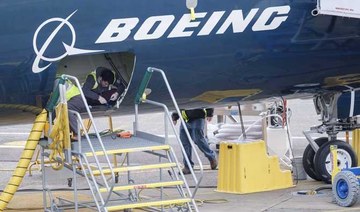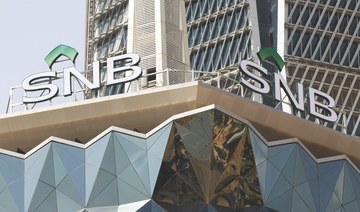WASHINGTON: Boeing and US aviation regulators are coming under intense scrutiny over the certification of the 737 MAX aircraft after news that two recent crashes share similarities.
On March 11, just a day after the Ethiopia crash left 157 dead, a grand jury in Washington issued a subpoena to at least one person involved in the plane’s certification, according to a Wall Street Journal article citing people close to the matter.
The subpoena, which came from a prosecutor in the Justice Department’s criminal division, seeks documents and correspondence related to the plane, according to the report.
A criminal inquiry is “an entirely new twist,” said Scott Hamilton, managing director of the Leeham Company, who recalled a probe of a 1996 ValuJet crash as the only other aviation probe that was not a civil investigation.
“Unlike France, where criminal investigations into aviation accidents seems common, it is very, very rare in the US,” Hamilton added.
The Transportation Department’s inspector general also is probing the approval of the 737 MAX by the Federal Aviation Administration (FAA), The Wall Street Journal also reported. Neither department responded to requests for comment from AFP.
The probe is focusing on the Maneuvering Characteristics Augmentation System, or MCAS, implicated in the Lion Air crash, which authorities have said shared similarities with the latest accident.
The Ethiopian Airlines crash on March 10 came less than five months after a 737 MAX 8 operated by Lion Air crashed in Indonesia, killing 189.
While it may take months for definitive conclusions, Ethiopian officials said Sunday there were “clear similarities” between the two catastrophes based on information from the flight data recorder.
The two incidents have prompted air transport regulators to ground 737 MAX aircraft worldwide, a surprising setback for a line of jets that has been flying for less than two years and is Boeing’s top seller.
An investigation by The Seattle Times — in the city where Boeing has a large manufacturing presence — showed numerous problems with the MCAS, including that it would repeatedly override a pilot’s actions based on one faulty sensor. The paper asked for a response from Boeing and the FAA at least a week prior to the latest crash.
Shares of Boeing dropped another 1.8 percent on Monday to $372.28. The company has fallen about 12 percent since the Friday before the crash.
FAA officials had no comment Monday on the investigations but reaffirmed that the certification for the plane followed standard procedure.
Boeing said it followed the rules in bringing the plane to the market.
“The 737 MAX was certified in accordance with the identical FAA requirements and processes that have governed certification of all previous new airplanes and derivatives,” Boeing said.
“The FAA considered the final configuration and operating parameters of MCAS during MAX certification and concluded that it met all certification and regulatory requirements.”
Later Monday, Boeing CEO Dennis Muilenburg sought to reassure clients and passengers of the firm’s commitment to safety in a video message.
“Safety is at the core of who we are at Boeing, and ensuring safe and reliable travel on our airplanes is an enduring value and our absolute commitment to everyone,” Muilenburg said.
“Soon we’ll release a software update and related pilot training for the 737 MAX that will address concerns discovered in the aftermath of the Lion Air Flight 610 accident.”
The 737 MAX was certified as a variant of the 737 Next Generation, the plane it replaced, despite major differences in the engine and the addition of the MCAS, according to documents available on the FAA’s website.
The motors on the new plane are heavier than in the 737 NG, posing more of a risk of stalling, so the MCAS was designed to protect against the possibility. But the Lion Air accident showed the system can erroneously correct for a stall when the plane is taking off, based on one bad sensor, and continuously fight the pilot for control.
US pilots complained to Boeing about the issues following the Lion Air crash.
Because of budget constraints, the FAA delegated aspects of the approval process to Boeing itself, according to sources.
Under a program, known as the Organization Designation Authorization (ODA), employees of Boeing are accredited by the FAA to assist in approving the aircraft — including design, production, flight tests, maintenance and other systems — as well as signing off on the training procedures of pilots on new planes.
The FAA last week said it already had ordered Boeing to develop a fix for problems with the MCAS system. But the agency was not able to describe any changes in the plane implemented by Boeing after the Lion Air accident.
According to one aviation expert who requested anonymity, Boeing had readied some modifications for the system by the end of 2018 but the regulatory approval and subsequent installation of the changes were delayed by the five-week US government shutdown.
Legislators Peter DeFazio, chairman of the House of Representatives Transportation and Infrastructure Committee, and Ted Cruz, who chairs a Senate transportation subcommittee, have each called for hearings to look into the 737 MAX’s certification.
US scrutinizing certification of Boeing 737 MAX aircraft
US scrutinizing certification of Boeing 737 MAX aircraft
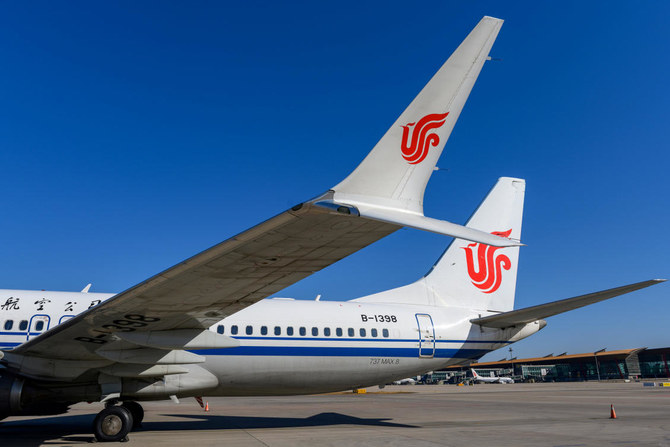
- The subpoena seeks documents and correspondence related to the plane
- A criminal inquiry is ‘an entirely new twist,’ said Scott Hamilton, managing director of the Leeham Company
Saudi banks and capital market poised to drive Vision 2030 objectives: S&P Global
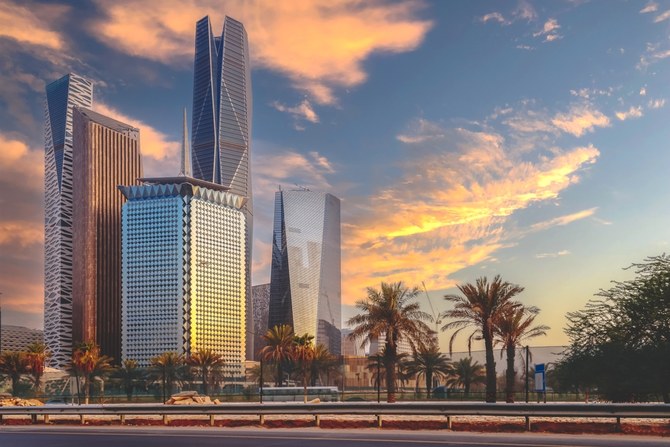
RIYADH: Saudi banks and the capital market are poised to make substantial contributions alongside the Public Investment Fund in achieving the objectives of Vision 2030, stated a report by S&P Global.
The latest analysis by the global rating agency underscores that their involvement in the Kingdom’s economic diversification endeavors will enhance leverage in both the Saudi private sector and the broader economy.
The report, citing public sources, indicated that the Saudi government’s transformation program aimed at enhancing the country’s economic, social, and cultural diversification will necessitate approximately $1 trillion in investments over several years.
“Part of this sum will come directly from the government and the Public Investment Fund, but S&P Global Ratings also expect banks and capital markets to contribute a significant amount,” stated the US-based agency in the report.
It added: “This will inevitably increase leverage in the Saudi private sector and the broader economy, albeit from low levels. The pace and extent of the increase in leverage in the corporate sector remain uncertain.”
As per the report, Saudi Arabia’s banking sector maintains a robust position, characterized by strong asset-quality indicators and overall capitalization.
The credit rating agency further anticipates that the banks’ sound profitability and conservative dividend payouts will persist, thereby bolstering their capitalization over the next one-to-two years.
S&P Global highlighted the expansion of the capital market in the Kingdom, noting that from January to May 2024, 13 private companies have announced potential listings on Saudi Arabia’s main market and parallel market.
The analysis projected that Saudi Arabia will experience a real gross domestic product growth of 2.2 percent in 2024 and 5 percent in 2025, with the non-oil private sector emerging as a key contributor to this expansion.
Earlier this month, S&P Global, in another report, noted that banks in Saudi Arabia are expected to pursue alternative funding options to manage the rapid expansion in lending.
The agency said that this pursuit of external funding could potentially impact the credit quality of Saudi Arabia’s banking sector.
“The ongoing financing needs of the Vision 2030 economic initiative and relatively sluggish deposits growth, is likely to incentivize banks to seek alternative sources of funding, including external funding,” said S&P Global.
Saudi Arabia’s non-oil revenues up by 3% in Q1 of 2024
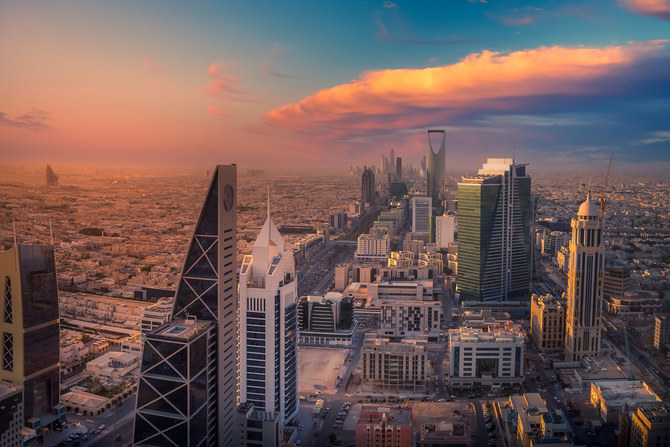
RIYADH: Saudi Arabia’s non-oil revenues rose by 3 percent to reach SR111.51 billion ($29.73 billion) in the first quarter of 2024 the final quarter of 2023, the Ministry of Finance said.
In its quarterly budget performance report, the ministry said the Kingdom posted total revenues of SR293.43 billion in the same quarter, while its public spending amounted to SR305.82 billion.
According to official data, total revenues slipped 18 percent as compared to Q4 of 2023.
In the first quarter of the current year, the Kingdom posted a budget deficit of SR12.39 billion with oil revenues reaching SR181.92 billion.
Saudi bank loans increase by 11% in March to hit $712bn, fueled by real estate activities
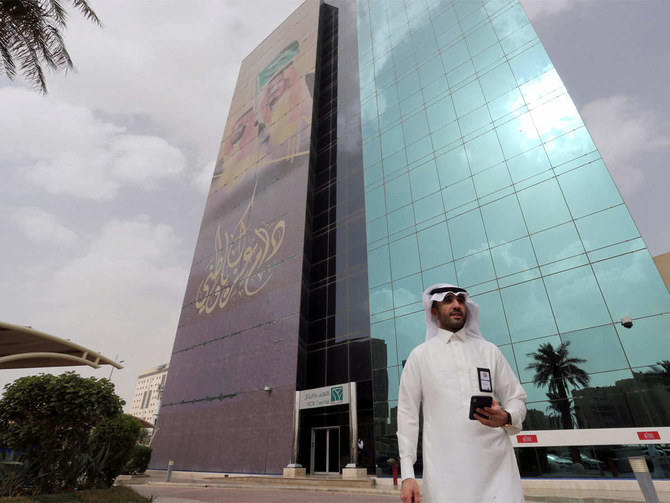
RIYADH: Saudi banks extended loans worth SR2.67 trillion ($711.5 billion) in March, marking an 11 percent increase as compared to the same month in 2023, according to the latest official data.
Figures released by the Saudi Central Bank, also known as SAMA, showed personal borrowings accounted for 35 percent of this growth, while the remaining 65 percent went to the corporate sector, particularly for real estate activities, as well as electricity, gas, and water supplies.
Real estate financing for corporate dealings specifically surged by 27 percent in the third month of the 2024, marking the highest annual growth rate in 10 months, reaching SR275.2 billion.
A study by Mortor Intelligence, which used 2023 as a base year, estimated the Kingdom’s real estate market at $69.51 billion in 2024, and expects it to reach $101.62 billion by 2029, growing at a compounded annual growth rate of 8 percent between 2024 and 2029.
The surge in real estate and construction endeavors may have heightened the need for debt-based financing primarily sourced from the local banking sector. Saudi banks play a central role in the provision of loans for real estate projects.
According to SAMA data, new retail residential mortgage loans experienced a notable increase, reaching a 14-month high at SR7.63 billion in March. This marked a 5 percent rise compared to the amount granted in the same month last year and a 10 percent increase from the previous month.
In March, lending for home purchases accounted for the largest portion, comprising 64 percent of new mortgages to individuals, totaling SR4.91 billion. The most notable growth, however, was observed in apartment loans, surging by 28 percent to reach SR2.24 billion. Meanwhile, land loans experienced a more modest growth of 4 percent, reaching SR474 million in new mortgages.
One factor contributing to this growth could be the need for residential properties from expatriates arriving in the Kingdom, along with government initiatives aimed at modernizing the financial system.
In a March study by Knight Frank, a notable trend emerged among expatriates, with 68 percent expressing a strong preference for owning an apartment rather than a villa. This inclination was especially prominent among individuals aged 35-45 and 45-55.
Growth in lending for electricity, gas and water supplies came as the second contributor in corporate loans after real estate, registering an annual rise of 27 percent to reach SR147.42 billion in March.
According to an April report by Global Data, the key sectors in the Saudi Arabia power market are the residential sector, commercial sector, industrial sector, and others. In 2023, the residential sector had the dominant share in the power consumption market.
The American International Trade Administration also stated in a January report that Saudi Arabia has experienced rapid economic and population growth since the discovery of oil. The population is projected to increase to 40.1 million by 2030.
Due to limited water resources, the country continues to invest in desalination facilities to meet rising water demands, aiming to deliver 2.18 billion cubic meters per year of desalinated water.
The Ministry of Environment, Water, and Agriculture has allocated $80 billion for water projects, with the wastewater treatment services market also expanding steadily according to the report. In 2021, Saudi Arabia built 133 wastewater treatment facilities, marking a 14.66 percent increase from the previous year.
SAMA data also revealed that financing for professional, scientific, and technical activities soared by 54 percent, hitting SR6.4 billion, marking the highest annual growth rate among sectors.
Education loans also showed robust growth, with an annual increase of 28 percent to reach SR6.27 billion. Additionally, financing for administrative and support service activities rose by 20 percent, totaling around SR34.22 billion.
While the proportion of lending allocated to the scientific and education sectors may currently be modest, the Saudi government acknowledges their pivotal significance in driving the Kingdom’s comprehensive transformation agenda.
Recognizing the paramount importance of innovation and fostering a culture of scientific inquiry, the government has implemented diverse initiatives aimed at nurturing these sectors.
These efforts are believed to have played a part in the gradual increase in lending support extended to these sectors by financial institutions. As the Kingdom continues to prioritize knowledge-based industries and endeavors, further advancements and investments in these areas are anticipated to amplify, propelling the nation towards its ambitious developmental goals.
Saudi Arabia’s car imports surge to 160k over last 2 years: official figures

RIYADH: Saudi Arabia’s car imports in 2023 hit 93,199, utilizing all modes of transportation — land, sea, and air — reflecting nearly a 40 percent growth from the previous year.
In the last two years, the Kingdom has imported a total of over 160,000 cars, with 66,870 imports recorded in 2022 alone, according to Hamoud Al-Harbi, the spokesperson for the Zakat, Tax, and Customs Authority, reported Saudi Press Agency.
This positions Saudi Arabia as one of the largest markets globally for automobiles, accounting for more than half of the car sales in the Gulf Cooperation Council countries, and ranking among the top 20 markets worldwide.
According to the authority’s spokesperson, cars were primarily imported from Japan, India, South Korea, the US, and Thailand to the Kingdom during the past two years.
Wael Al-Dhayyab, the official spokesperson for the Saudi Standards, Metrology, and Quality Organization, underscored the rigorous efforts undertaken by the Vehicle Inspection Unit in 2023. They inspected 60,473 vehicles to uphold the highest technical and safety standards.
Concurrently, 18,150 energy efficiency certificates were issued for tire products, highlighting SASO’s commitment to ensuring tire quality and safety in the Saudi market.
Al-Dhayyab emphasized that these endeavors demonstrate the organization’s dedication to enforcing stringent standards, fostering tire quality, and safety.
Moreover, he stressed the body’s pivotal role in advancing energy efficiency and endorsing initiatives aimed at enhancing product safety and economic growth.
Additionally, Al-Dhayyab noted a significant milestone in 2023, with SASO awarding 172 conformity certificates for electric vehicles, witnessing a 465 percent surge from the previous year.
This emphasizes the organization’s crucial role in facilitating the shift toward sustainable energy adoption.
Furthermore, he pointed out that the body issued 1,505 fuel efficiency cards for new light vehicles, indicating its commitment to promoting eco-friendly transportation solutions.
The surge in the import of motor vehicles led to Saudi banks witnessing a 7.67 percent increase in letters of credit to the private sector in the first 11 months of 2023, compared to the same period the previous year.
The data, released by the Saudi Central Bank, revealed that settled LCs and received bills to this sector hit SR155.19 billion ($41.38 billion).
LCs, a financial document issued by a bank, guarantee payment to the seller upon fulfilling specified conditions in a trade transaction.
The growth is primarily attributed to an upsurge in the import of motor vehicles, accounting for around 75 percent of the overall increase.
The import value in this category reached SR39.7 billion, marking a 26.29 percent increase, the data showed.
UAE’s Mubadala Capital plans $13.5bn investment in Brazil’s biofuel sector
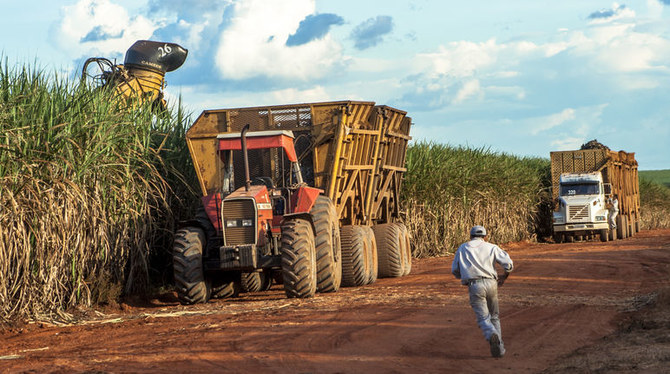
RIYADH: Brazil’s biofuel market is set for substantial growth as UAE’s Mubadala Capital has committed to invest $13.5 billion over the next decade.
Oscar Fahlgren, head of Brazil strategy at the sovereign wealth fund, disclosed the budget for the initiative during an interview with the Financial Times. He divulged the details of the fund’s plans to produce renewable diesel and sustainable aviation kerosene primarily utilizing non-food plant matter.
In his interview with the newspaper, Fahlgren said Mubadala’s Brazilian subsidiary, Acelen, will initiate the development of a large-scale biofuel project by 2026.
The fund’s executive stated that the funds will be sourced through a blend of equity and debt over a span of five to 10 years.
The endeavor will encompass five modules, each valued at $2.7 billion, housing a new biorefinery capable of processing 20,000 barrels of fuel per day. Additionally, it will include the necessary infrastructure and cultivated acreage to sustain the input crop.
“It’s all about feedstock (which) in reality is agriculture. And Brazil is probably the best-placed country on the planet when it comes to agricultural proficiency because of the climate and the fertile soil,” said Fahlgren, adding, “Brazil is to agriculture what Abu Dhabi is to oil.”
The project will also include the conversion of an existing oil refinery in the northeastern Brazilian state of Bahia acquired from government-owned Petrobras in 2021.
“It’s a very important capital project,” Fahlgren said. “I see tremendous opportunity to invest in the green energy transition space in Brazil,” he added.
Mubadala’s venture into bioenergy will leverage its existing $6 billion investments in the country, constituting approximately a quarter of the group’s global portfolio.
“We’ve been very active investing in Brazil, for the past 10-plus years, in an environment where most foreign investors have been shying away,” Fahlgren said.
Mubadala also plans to open a stock exchange in Brazil next year through its Americas Trading Group.
“Brazil is a very large country. It has only one stock exchange. And I think that’s suboptimal infrastructure for the players that operate in this segment,” said Fahlgren.
“It will probably be a staged launch — perhaps start with equities, then expand. No asset classes are off the table.”
The asset management arm of the Emirati sovereign wealth fund is increasing its bets on Latin America’s largest economy, where its holdings span metro lines and medical universities to a majority stake in the local owner of the Burger King brand.
“We’re very bullish on the investment climate in Brazil right now and the opportunities we see,” said Fahlgren. “We do have a number of assets that are relatively mature today, and could be potential exit candidates in the not-too-distant future,” he added.


